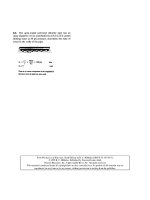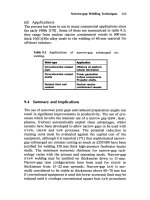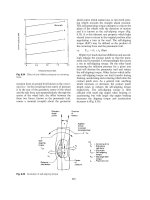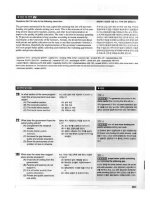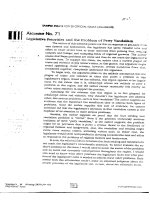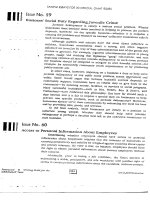GMAT reading Episode 2 Part 6 doc
Bạn đang xem bản rút gọn của tài liệu. Xem và tải ngay bản đầy đủ của tài liệu tại đây (159.27 KB, 9 trang )
- 111 -
(E) suggest an alternative approach
Passage 59
Schools expect textbooks to be a
valuable source of
information for students. My research
suggests, however,
that textbooks that address the place of
Native Americans
within he history of the United States
distort history to suit
(5)
a particular cultural value system.
In some textbooks, for
example, settlers are pictured as more humane, complex,
skillful, and wise than Native American. In essence,
textbooks stereotype and deprecate the numerous Native
American cultures while reinforcing the attitude that the
(10)
European conquest of the New
World denotes the superi-
ority of European cultures. Although
textbooks evaluete
Native American architecture,
political systems
,
and home-
making. I contend that they do it from an ethnocentric,
(15
)
European perspective without
recognizing that other per-
spectives are possible.
One argument against my contention asserts that, by
nature, textbooks are culturally
biased and that I am simply
underestimating children’s ability to see through these
(20)
biases. Some researchers even claim that by the time
students are in high school, they know they cannot take
textbooks literally. Yet substantial evidence
exists to the
contrary. Two researchers, for example,
have conducted
studies that suggest that
children’s attitudes about particular
(25
)
culture are strongly influenced by the textbooks used in
schools. Given this, an ongoing, careful review of how
school textbooks depict Native American is certainly
warranted.
1. Which of the following would most logically be the
topic of the paragraph immediately following the
passage?
(A) Specific ways to evaluate the biases of United States
history textbooks
(B) The centrality of the teacher’s role in United States
history courses
(C) Nontraditional methods of teaching United States
history
(D) The contributions of European immigrants to the
development of the United States
(E) Ways in which parents influence children’s political
attitudes
2. The primary purpose of the passage is to
(A) describe in detail one research study regarding the
impact of history textbooks on children’s attitudes
and beliefs about certain cultures
(B) describe revisions that should be made to United
States history textbooks
(C) discuss the difficulty of presenting an accurate
history of the United States
(D) argue that textbooks used in schools stereotype
Native Americans and influence children’s attitudes
(E) summarize ways in which some textbooks give
distorted pictures of the political systems developed
by various Native American groups
3. The author mentions two researchers’ studies (lines22-
25) most likely in order to
(A) suggest that children’s political attitudes are formed
primarily through textbooks
(B) counter the claim that children are able to see
through stereotypes in textbooks
(C) suggest that younger children tend to interpret the
messages in textbooks more literally than do older
children
(D) demonstrate that textbooks carry political messages
meant to influence their readers
(E) prove that textbooks are not biased in terms of their
political presentations
4. The author’s attitude toward the content of the history
textbooks discussed in the passage is best described as
one of
(A) indifference
(B) hesitance
(C) neutrality
(D) amusement
(E) disapproval
Generated by Foxit PDF Creator © Foxit Software
For evaluation only.
- 112 -
5. It can be inferred from the passage that the researchers
mentioned in line 19 would be most likely to agree
with which of the following statements?
(A) Students form attitudes about cultures other than
their own primarily inside the school environment.
(B) For the most part, seniors in high school know that
textbooks can be biased.
(C) Textbooks play a crucial role in shaping the attitudes
and beliefs of students.
(D) Elementary school students are as likely to
recognize biases in textbooks as are high school
students.
(E) Students are less likely to give credence to history
textbooks than to mathematics textbooks.
6. The author implies tha5t which of the following will
occur if textbooks are not carefully reviewed?
(A) Children will remain ignorant of the European
settlers’ conquest of the New World.
(B) Children will lose their ability to recognize biases
in textbooks.
(C) Children will form negative stereotypes of Native
Americans.
(D) Children will develop an understanding of
ethnocentrism.
(E) Children will stop taking textbooks seriously.
Passage 60
Until recently, scientists did not know of a
close verte-
brate analogue to the
extreme form of altruis
m
abserved in
eusocial insects like ants and bees
, whereby individuals
cooperate, sometimes even sacrificing
their own oppor
-
( 5)
tunities to survive and reproduce, for
the good of others.
However, such a vertebrate
society may exist among under-
ground colonies of the
highly social rodent Heterocephalus
glaber, the naked mole rat.
A naked mole rat colony, like
a beehive, wasp’s nest, or
(10)
termite mound, is ruled by its queen, or reproducing
female. Other adult female mole rats neither
ovulate nor
breed. The queen of the largest member
of the colony, and
she maintains her breeding status through a mixture of
behavioral and, presumably,
chemical control. Queen
s
have
(15)
been long-lived in captivity, and when they die or are
removed from a colony
one sees violent fighting
for breed-
ing status among the
larger remaining females, leading to a
takeover by a new queen.
Eusocial insect societies have rigid caste systems, each
(20)
insects’s role being
defined by its behavior
,
body shape, and
physiology. In naked mole rat
societies, on the other hand,
differences in behavior are
related primarily to reproductive
status (reproduction being limited to
the queen and a few
males), body size, and perhaps
age. Smaller nonbreeding
(25)
members, both male and female,
seem to participate pri-
marily in gathering food, transporting nest
material, and
tunneling. Larger nonreaders are active in
defending the
colony and perhaps in removing dirt from the tunnels.
Jarvis’ work has suggested that
differences
in growth rates
may influence the length
of time that an individual performs
(30)
a task, regardless of its age.
Cooperative breeding has evolved
many times in verte-
brates, but unlike naked mole rats, most
cooperatively
breeding vertebrates (except the
wild dog, Lycaon pictus)
(
35)
are dominated by a pair of breeders
rather than by a single
breeding female. The division of
labor within social groups
is less pronounced among other vertebrates
than among
naked mole rats, colony size is much
smaller, and mating
by subordinate females may not be totally suppressed,
(40)
whereas in naked mole rat
colonie
s
subordinate females are
not sexually active, and many never breed.
1. Which of the following most accurately states the main
idea of the passage?
(A) Naked mole rat colonies are the only known
examples of cooperatively breeding vertebrate
societies.
(B) Naked mole rat colonies exhibit social organization
based on a rigid caste system.
(C) Behavior in naked mole rat colonies may well be
a close vertebrate analogue to behavior in eusocial
insect societies.
(D) The mating habits of naked mole rats differ from
those of any other vertebrate species.
Generated by Foxit PDF Creator © Foxit Software
For evaluation only.
- 113 -
(E) The basis for the division of labor among naked
mole rats is the same as that among eusocial insects.
2. The passage suggests that Jarvis’ work has called into
question which of the following explanatory variables
for naked mole rat behavior?
(A) Size
(B) Age
(C) Reproductive status
(D) Rate of growth
(E) Previously exhibited behavior
3. It can be inferred from the passage that the performance
of tasks in naked mole rat colonies differs from task
performance in eusocial insect societies in which of the
following ways?
(A) In naked mole rat colonies, all tasks ate performed
cooperatively.
(B) In naked mole rat colonies, the performance of
tasks is less rigidly determined by body shape.
(C) In naked mole rat colonies, breeding is limited to
the largest animals.
(D) In eusocial insect societies, reproduction is limited
to a single female.
(E) In eusocial insect societies, the distribution of
tasks is based on body size.
4. According to the passage, which of the following is a
supposition rather than a fact concerning the queen in a
naked mole rat colony?
(A) She is the largest member of the colony.
(B) She exerts chemical control over the colony.
(C) She mates with more than one male.
(D) She attains her status through aggression.
(E) She is the only breeding female.
5. The passage supports which of the following inferences
about breeding among Lycaon pictus?
(A) The largest female in the social group does
not maintain reproductive status by means of
behavioral control.
(B) An individual’s ability to breed is related primarily
to its rate of growth.
(C) Breeding is the only task performed by the breeding
female.
(D) Breeding in the social group is not cooperative.
(E) Breeding is not dominated by a single pair of dogs.
Passage 61
Coral reefs are one of the most fragile, biologically
complex, and diverse marine ecosystem on Earth. This
ecosystem is one of the fascinating paradoxes
of the bio
-
sphere: how do clear, and thus nutrient-poor,
waters sup
-
(5)
port such prolific and productive
communities? Part of the
answer lies within the tissues of the corals themselves.
Symbiotic cells of algae known as
zooxanthellae carry out
photosynthesis using the metabolic wastes of the coral
thereby producing food for themselves, for their corals,
(10)
hosts, and even for other members
of the reef community.
This symbiotic process allows organisms
in the reef com
-
munity to use sparse nutrient resources efficiently.
Unfortunately for coral reefs, however, a variety of
human activities are causing worldwide degradation of
(15)
shallow marine habitats by adding
nutrients to the (water.
Agriculture, slash-and-burn land
clearing, sewage disposal
and manufacturing that creates waste by-products all
increase nutrient loads in these
waters. Typical symptoms
of reef decline are destabilized herbivore
populations and
(20)
an increasing abundance
of algae
and filter-feeding animals.
Declines in reef communities are
consistent with observa-
tions that nutrient input is
increasing in direct proportion to
growing human populations,
thereby threatening reef com-
(25)
munities sensitive to subtle changes in nutrient input to
their waters.
1. The passage is primarily concerned with
(A) describing the effects of human activities on algae in
coral reefs
(B) explaining how human activities are posing a threat
to coral reef communities
(C) discussing the process by which coral reefs
Generated by Foxit PDF Creator © Foxit Software
For evaluation only.
- 114 -
deteriorate in nutrient-poor waters
(D) explaining how coral reefs produce food for
themselves
(E) describing the abundance of algae and filter-feeding
animals in coral reef areas
2. The passage suggests which of the following about coral
reef communities?
(A) Coral reef communities may actually be more likely
to thrive in waters that are relatively low in nutrients.
(B) The nutrients on which coral reef communities
thrive are only found in shallow waters.
(C) Human population growth has led to changing ocean
temperatures, which threatens coral reef
communities.
(D) The growth of coral reef communities tends to
destabilize underwater herbivore populations.
(E) Coral reef communities are more complex and
diverse
than most ecosystems located on dry land.
3. The author refers to “filter-feeding animals” (line 20)
in order to
(A) provide an example of a characteristic sign of reef
deterioration
(B) explain how reef communities acquire sustenance
for survival
(C) identify a factor that helps herbivore populations
thrive
(D) indicate a cause of decreasing nutrient input in
waters that reefs inhabit
(E) identify members of coral reef communities that rely
on coral reefs for nutrients
4. According to the passage, which of the following is a
factor that is threatening the survival of coral reef
communities?
(A) The waters they inhabit contain few nutrient
resources.
(B) A decline in nutrient input is disrupting their
symbiotic relationship with zooxanthellae
(C) The degraded waters of their marine habitats have
reduced their ability to carry out photosynthesis
(D) They are too biologically complex to survive in
habitats with minimal nutrient input.
(E) Waste by-products result in an increase in nutrient
input to reef communities.
5. It can be inferred from the passage that the author
describes coral reef communities as paradoxical most
likely for which of the following reasons?
(A) They are thriving even though human activities
have depleted the nutrients in their environment.
(B) They are able to survive in spite of an over-
abundance of algae inhabiting their waters.
(C) They are able to survive in an environment with
limited food resources.
(D) Their metabolic wastes contribute to the degra-
dation of the waters that they inhabit.
(E) They are declining even when the water sur-
rounding them remains clear.
Passage 62
Two divergent definitions have dominated
sociologists’
discussions of the nature of ethnicity.
The first emphasizes
the primordial and unchanging character of ethnicity. In
this view, people have an essential
need for belonging that
(5)
is satisfied by membership in groups based on shared
ancestry and culture. A different
conception of ethnicity
de-emphasizes the cultural component
and defines ethnic
groups as interest groups. In this view,
ethnicity serves as
a way of mobilizing a certain population behind issues
(10)
relating to its economic position. While both of these
definitions are useful, neither fully captures
the dynamic
and changing aspects of ethnicity in the United States.
Rather, ethnicity is more satisfactorily
conceived of as a
process in which preexisting
communal bonds and common
(15)
cultural attributes are adapted for instrumental purposes
according to changing real-life situations.
One example of this process is the rise
of participation
by Native American people in the broader
United States
Generated by Foxit PDF Creator © Foxit Software
For evaluation only.
- 115 -
political system since the Civil Rights
movement of the
(20)
1960’s. Besides leading Native Americans
to participate
more actively in politics (the
number of Native American
legislative
officeholders more than doubled), thi
s
movement
also evoked increased
interest in tribal history and traditional
culture. Cultural and instrumental components of
(25 )
ethnicity are not mutually exclusive, but
rather reinforce
one another.
The Civil Rights movement also brought
changes in the
uses to which ethnicity was put by Mexican American
people. In the 1960’s, Mexican Americans formed
(30)
community-based
political groups
that emphasized ancestral
heritage as a way of mobilizing
constituents. Such emerg-
ing issues as immigration and voting
rights gave Mexican
American advocacy
groups the means by which to promote
ethnic solidarity. Like European ethnic groups in the
(35)
nineteenth-century United States, late-twentieth-
century
Mexican American leaders
combined ethnic with contem
-
porary civic symbols.
In 1968 Henry Censors, then mayor
of San Antonio, Texas, cited
Mexican leade
r
Benito Juarez
as a model for Mexican Americans in
their fight for con-
(40)
temporary civil rights. And every
year, Mexican Americans
celebrate Cinco de Mayo as fervently as many Irish
American people
embrace St. Patrick’s Day (both are major
holidays in the countries of origin), with both holidays
having been reinvented in the context of
the United States
and linked to ideals, symbols, and heroes
of the United
States.
1. Which of the following best states the main idea of the
passage?
(A) In their definitions of the nature of ethnicity,
sociologists have underestimated the power of the
primordial human need to belong.
(B) Ethnicity is best defined as a dynamic process that
combines cultural components with shared
political and economic interests.
(C) In the United States in the twentieth century, ethnic
groups have begun to organize in order to further
their political and economic interests.
(D) Ethnicity in the United States has been significantly
changed by the Civil Rights movement.
(E) The two definitions of ethnicity that have dominated
sociologists discussions are incompatible
and should be replaced by an entirely new approach.
2. Which is the following statements about the first two
definitions of ethnicity discussed in the first paragraph
is supported by the passage?
(A) One is supported primarily by sociologists, and the
other is favored by members of ethnic groups.
(B) One emphasizes the political aspects of ethnicity,
and the other focuses on the economic aspects.
(C) One is the result of analysis of United States
populations, and the other is the result of analysis
of
European populations.
(D) One focuses more on the ancestral components
of ethnicity than does the other.
(E) One focuses more on immigrant groups than does
the other.
3. The author of the passage refers to Native American
people in the second paragraph in order to provide an
example of
(A) the ability of membership in groups based on
shared ancestry and culture to satisfy an essential
human need.
(B) how ethnic feelings have both motivated and been
strengthened by political activity
(C) how the Civil Rights movement can help promote
solidarity among United States ethnic groups
(D) how participation in the political system has
helped to improve a group’s economic situation
(E) the benefits gained from renewed study of ethnic
history and culture
4. The passage supports which of the following statements
about the Mexican American co+munity?
(A) In the 1960’s the Mexican American community
began to incorporate the customs of another ethnic
group in the United States into the observation of its
Generated by Foxit PDF Creator © Foxit Software
For evaluation only.
- 116 -
own ethnic holidays.
(B) In the 1960’s Mexican American community
groups promoted ethnic solidarity primarily in
order to effect economic change
(C) In the 1960’s leader of the Mexican American
community concentrated their efforts on promoting
a renaissance of ethnic history and culture
(D) In the 1960’s members of the Mexican American
community were becoming increasingly concerned
about the issue of voting rights.
(E) In the 1960’s the Mexican American community
had greater success in mobilizing constituents
than did other ethnic groups in the United States.
5. Which of the following types of ethnic cultural
expression is discussed in the passage?
(A) The retelling of traditional narratives
(B) The wearing of traditional clothing
(C) The playing of traditional music
(D) The celebration of traditional holidays
(E) The preparation of traditional cuisine
6. Information in the passage supports which of the
following statements about many European ethnic
groups in the nineteenth-century United States?
(A) They emphasized economic interests as a way of
mobilizing constituents behind certain issues.
(B) They conceived of their own ethnicity as being
primordial in nature.
(C) They created cultural traditions that fused United
States symbols with those of their countries of
origin.
(D) They de-emphasized the cultural components of
their communities in favor of political interests.
(E) They organized formal community groups designed
to promote a renaissance of ethnic history and
culture.
7. The passage suggests that in 1968 Henry Cisneros most
likely believed that
(A) many Mexican American would respond positively
to the example of Benito Juarez.
(B) many Mexican American were insufficiently
educated in Mexican history
(C) the fight for civil fights in the United States had
many strong parallels in both Mexican and rish
history.
(D) the quickest way of organizing community-based
groups was to emulate the tactics of Benito Juarez
(E) Mexican Americans should emulate the strategies
of Native American political leaders.
Passage 63
The fact that superior service
can generate a competitive
advantage for a company does not
mean that every attempt
at improving service will create such
an advantage. Invest-
ments in service, like those in production
and distribution,
(5)
must be balanced against other
types of investments on the
basis of direct, tangible benefits such as cost
reduction and
increased revenues. If a
company is already effectively
on a
par with its competitors because it provides service that
avoids a damaging reputation and keeps
customers from
(10)
leaving at an unacceptable rate,
then investment in higher
service levels may be wasted, since
service is a deciding
factor for customers only in extreme situations.
This truth was not apparent
to managers of one regional
bank, which failed to improve its competitive position
(15)
despite its investment in reducing the
time a customer had
to wait for a teller. The bank managers did not
recognize
the level of customer inertia in the consumer banking
industry that arises from the inconvenience
of switching
banks. Nor did they analyze their service
improvement to
(20)
determine whether it would attract
new customers by pro-
ducing a new standard of service that would excite cus-
tomers or by proving difficult for
competitors to copy. The
only merit of the improvement was that
it could easily be
described to customers.
1. The primary purpose of the passage is to
(A) contrast possible outcomes of a type of business
Generated by Foxit PDF Creator © Foxit Software
For evaluation only.
- 117 -
investment
(B) suggest more careful evaluation of a type of
business investment
(C) illustrate various ways in which a type of business
investment could fail to enhance revenues
(D) trace the general problems of a company to a
certain type of business investment
(E) criticize the way in which managers tend to analyze
the costs and benefits of business investments
2. According to the passage, investments in service are
comparable to investments in production and
distribution in terms of the
(A) tangibility of the benefits that they tend to confer
(B) increased revenues that they ultimately produce
(C) basis on which they need to be weighed
(D) insufficient analysis that managers devote to them
(E) degree of competitive advantage that they are likely
to provide
3. The passage suggests which of the following about
service provided by the regional bank prior to its
investment in enhancing that service?
(A) It enabled the bank to retain customers at an
acceptable rate
(B) It threatened to weaken the bank’s competitive
position with respect to other regional banks
(C) It had already been improved after having caused
damage to the bank’s reputation in the past.
(D) It was slightly superior to that of the bank’s regional
competitors.
(E) It needed to be improved to attain parity with the
service provided by competing banks.
4. The passage suggests that bank managers failed to
consider whether or not the service improvement
mentioned in line 19
(A) was too complicated to be easily described to
prospective customers
(B) made a measurable change in the experiences of
customers in the bank’s offices
(C) could be sustained if the number of customers
increased significantly
(D) was an innovation that competing banks could
have imitated
(E) was adequate to bring the bank’s general level of
service to a level that was comparable with that of
its competitors
5. The discussion of the regional bank (line 13-24) serves
which of the following functions within the passage as a
whole?
(A) It describes an exceptional case in which
investment in service actually failed to produce a
competitive advantage.
(B) It illustrates the pitfalls of choosing to invest in
service at a time when investment is needed
more urgently in another area.
(C) It demonstrates the kind of analysis that managers
apply when they choose one kind of service
investment over another
(D) It supports the argument that investments in
certain aspects of service are more advantageous
than investments in other aspects of service.
(E) It provides an example of the point about
investment in service made in the first paragraph.
6. The author uses the word “only” in line 23 most likely
in order to
(A) highlight the oddity of the service improvement
(B) emphasize the relatively low value of the
investment in service improvement
(C) distinguish the primary attribute of the service
improvement from secondary attributes
(D) single out a certain merit of the service
improvement from other merits
(E) point out the limited duration of the actual service
improvement
Generated by Foxit PDF Creator © Foxit Software
For evaluation only.
- 118 -
《新东方 GMAT 阅读精解》答案
1.BECACBEC
3.EBAEDABB
5.EDBCBAEDA
7.ECDBBDC
9.EACCBEDAB
11.BEECACB
13.DDCDCDEB
15.DCADCDCA
17.AEEBCDCAE
19.EDBCBDAD
21.DDBADECA
23.DCAECBCA
25.BEBCACAC
27.BCECBED
29.ECCAXEDB
31.DEECCDBD
33.BABDBCB
35.BECDEADE
37.DEADCBAA
39.CDCEBE
41.BCEDACEA
43.BCECECCA
45.DAEBCEA
47.CBACEED
2.ABCEBCBCD
4.DBCBABA
6.ADBAECDBA
8.ACADEAEDC
10.DDDADEBBA
12.ADCCCBBED
14.EEDEABCDD
16.ACBBCDB
18.DDBCBCEAB
20.CADAACB
22.BDEDDBCA
24.BDAEECA
26.ECEEBDDA
28.BBDDDCD
30.BADBACED
32.BCCCABBD
34.CDDBACC
36.BACAAEBD
38.EAECBCDAA
40.ABDBCCDE
42.CBEAAC
44.BACBDACD
46.CBECACD
48.CDEB
49.DEDDCA
51.CDBCAB
53.CBECDA
55.CBEEEAA
57.CDDAE
59.ADBEBC
61.BAAEC
63.BCADEB
Generated by Foxit PDF Creator © Foxit Software
For evaluation only.
- 119 -
50.DCACEB
52.BABBDE
54.DDCEBE
56.EDADBC
58.CDEDB
60.CBBEAC
62.BDBDDCA
标 X 表示该题不计分。
Generated by Foxit PDF Creator © Foxit Software
For evaluation only.


